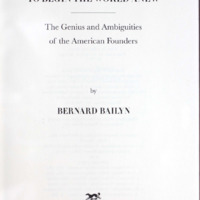-
Title
-
To begin the world anew : the genius and ambiguities of the American founders
-
Description
-
The Pulitzer Prize-winning historian offers a series of profiles of the characteristics, achievements, political philosophy, influence, and ambiguities of some of the most important figures of the Revolutionary generation.
-
Identifier
-
1079526
-
375413774
-
Creator
-
Bailyn, Bernard
-
Format
-
1st ed.
-
Source
-
Brian Lamb Booknotes Collection
-
Gift of Brian Lamb, 2011.
-
Catalog record
-
Language
-
eng
-
Date
-
2003
-
Program air date: March 23, 2003
-
Publisher
-
Knopf
-
George Mason University. Libraries. Special Collections & Archives
-
Text
-
Transcription of Annotations
Front and back endpapers include notes concerning the concept of the separation of powers, the principles that would guide American society, Jefferson's loathing of slavery, the significance of the Federalist Papers, the four stages of discussion that led to the new constitution - 1) the secret constitutional convention in Philadelphia, 2) the public debate, 3) the first session of Congress, 4) implementation of Washington's government -, and the circulation of the Declaration of Independence throughout Europe within a month of its publication. -- Annotations by Brian Lamb in the margins and underlining of pertinent phrases throughout the book. - Examples: p. 33: "So they reconsidered the immemorial doctrine of the separation of powers, and recast the elements involved from legalized social orders - crown, nobility, and commons - which had never been a direct part of their lives, to functioning branches of government - executive, legislative, judicial - which had been." -- p. 36: "We have an obligation to remain on the margins." -- p. 43/44: "... legislatures would be truly representative, popular majorities would rule; the institutions of government would be strictly separated so that no person or group of people would exercise undue power, power itself would be restricted, establishments of religion would be forever banished; and the human freedoms for which mankind had yearned - freedom of speech, of the press, of worship, and the right to the security of property and to impartial judicial proceedings presided over by judges independent of political pressures - all this would be perfectly protected by the instruments of free government." - p. 123: "The Federalist authors shared the common belief that most people everywhere, in their deepest nature, are selfish and corruptible and that the desire for domination is so overwhelming that no one should be trusted with unqualified authority." -- p. 149: "I think an equally important challenge is our own responsibility to probe the character of our constitutional establishment, as the eighteenth-century provincials probed the establishment they faced, to recognize that for many in our own time and within our own culture, it has become scholastic in its elaboration, self-absorbed, self-centered, and in significant ways distant from the ordinary facts of life."
-
Subject
-
"Statesmen--United States--History--18th century."
-
"Presidents--United States--History--18th century."
-
"Revolutionaries--United States--History--18th century."
-
"Constitutional history--United States."
-
Relation
-
Original Booknotes interview
-
Rights
-
This work may be protected by copyright laws and is provided for educational and research purposes only. Any infringing use may be subject to disciplinary action and/or civil or criminal liability as provided by law. If you believe that you are the rights-holder and object to Mason’s use of this image, please contact speccoll@gmu.edu.
 1079526.pdf
1079526.pdf